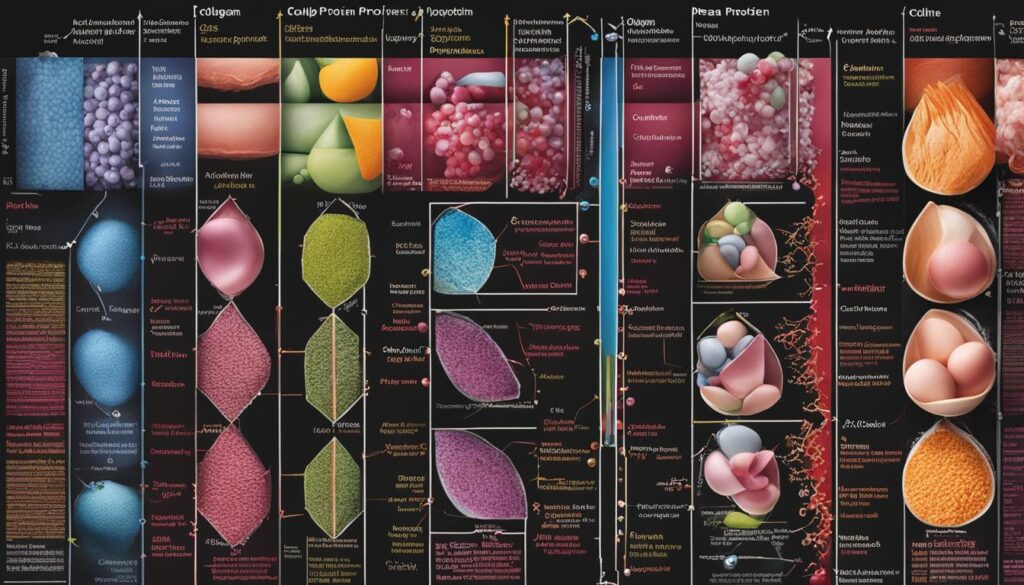Collagen, the most abundant protein in animals, is often touted for its benefits in promoting joint health and enhancing the appearance of skin, hair, and nails. However, when it comes to being a complete protein, collagen falls short. It lacks essential amino acids like leucine and tryptophan, making it an incomplete protein source. While collagen does contain other amino acids like arginine and glycine, which have their own important roles in the body, it may not be the best choice for muscle growth and as a high-quality protein source.
Research comparing collagen to whey protein, a complete protein source, has shown that whey protein induces significantly more muscle growth due to its higher leucine content. Although collagen does contain amino acids that contribute to creatine production, it is unclear whether collagen or creatine is responsible for any potential anabolic benefits.
Key Takeaways:
- Collagen is not a complete protein, as it lacks essential amino acids like leucine and tryptophan.
- Whey protein, a complete protein source, has been found to promote more muscle growth compared to collagen.
- Collagen does contain amino acids that support creatine production, but more research is needed to determine its impact on muscle growth.
- For individuals seeking a high-quality protein source for muscle growth, options like whey protein or other complete proteins may be more suitable than collagen.
- Collagen supplements can still be beneficial for joint health and other non-muscle-related benefits.
The Role of Amino Acids in Protein Synthesis
Amino acids are essential for the process of protein synthesis in the body. When it comes to collagen, an incomplete protein, it lacks the necessary amino acids for optimal muscle growth and protein synthesis. While collagen does contain other amino acids like arginine and glycine, they may not have the same impact on muscle growth as essential amino acids like leucine. Leucine, in particular, plays a critical role in promoting muscle growth, making it a key component of complete proteins that are more effective in supporting protein synthesis.
Collagen, although it has benefits for joint health and overall well-being, may not be the best choice for individuals seeking to maximize muscle growth. Complete protein sources, such as whey or plant-based proteins like pea protein, provide all essential amino acids, including leucine, necessary for muscle repair and growth. The absence of these amino acids in collagen limits its potential as a high-quality protein source for muscle development.
In conclusion, while collagen plays a vital role in joint health, its effectiveness as a protein source for muscle growth and protein synthesis is limited. Complete proteins that contain essential amino acids like leucine are more suitable for individuals seeking optimal muscle development. Therefore, considering other protein sources, such as whey or plant-based proteins like pea protein, may be a better choice for those looking to support their fitness goals and overall health.
The Role of Amino Acids in Protein Synthesis
| Amino Acid | Collagen | Complete Proteins |
|---|---|---|
| Leucine | Lacks | Contains |
| Tryptophan | Lacks | Contains |
| Arginine | Contains | Contains |
| Glycine | Contains | Contains |
Plant-Based Proteins vs. Collagen
When it comes to choosing a high-quality protein source, collagen may not be the best option. Plant-based proteins, on the other hand, offer a complete protein profile that includes all essential amino acids needed for muscle growth and overall health. One excellent example of a plant-based protein is pea protein, which contains not only leucine and tryptophan but also other essential amino acids.
Pea protein stands out as a complete protein source, making it a suitable alternative to collagen for those following a plant-based diet or seeking to maximize their protein intake. Additionally, pea protein is allergen-free and environmentally friendly, making it a versatile and sustainable choice for individuals looking for a high-quality protein source.
Comparison: Collagen vs. Pea Protein
| Protein Source | Essential Amino Acids | Benefits |
|---|---|---|
| Collagen | Lacks leucine and tryptophan | Beneficial for joint health |
| Pea Protein | Contains all essential amino acids | Supports muscle growth and overall health |
As shown in the comparison table, collagen lacks essential amino acids like leucine and tryptophan, limiting its potential as a high-quality protein source. In contrast, pea protein provides all essential amino acids, making it a complete protein that can support muscle growth and protein synthesis. It’s important to consider one’s dietary goals and preferences when choosing a protein source, but for those seeking a complete protein, pea protein offers a superior alternative to collagen.
The Benefits of Collagen for Joint Health
Collagen supplements may not be a complete protein source, but they offer significant benefits for joint health. Studies have shown that collagen peptides can reduce inflammation, alleviate joint pain, and aid in the repair of damaged cartilage. These properties make collagen an essential component of a balanced diet for individuals with joint issues or those looking to maintain optimal joint health.
While the exact process by which collagen enhances joint health is still being researched, its ability to mitigate inflammation and reduce pain associated with joint degeneration is well-documented. This makes collagen an attractive option for individuals seeking natural solutions for joint-related problems.
The Benefits of Collagen for Joint Health
Collagen supplements offer the following benefits for joint health:
- Reduces inflammation
- Alleviates joint pain
- Aids in cartilage repair
By incorporating collagen into their daily routine, individuals can support their joint health and improve their overall quality of life.
Note: It’s important to consult with a healthcare professional before starting any new dietary supplement or making significant changes to your diet.
| Collagen Benefits for Joint Health | Scientific Evidence |
|---|---|
| Reduces inflammation | Studies have shown that collagen peptides can decrease inflammatory markers in the body, leading to reduced joint inflammation. |
| Alleviates joint pain | Research has demonstrated that collagen supplementation can help reduce joint pain, improving overall comfort and mobility. |
| Aids in cartilage repair | Studies have indicated that collagen peptides can stimulate the synthesis of new cartilage cells, supporting the repair of damaged cartilage in joints. |
While collagen may not be a complete protein, its benefits for joint health make it a valuable addition to a balanced diet. Remember to prioritize overall nutritional needs and consult with a healthcare professional for personalized recommendations regarding collagen supplementation and joint health.
The Importance of Collagen Timing and Whole Foods
When it comes to maximizing the effects of collagen ingestion, timing and consumption with whole foods play a crucial role. Some experts suggest that collagen may elicit an anabolic effect only when taken alongside a whole food source, making it preferable as a post-workout supplement. While the exact mechanism by which collagen interacts with whole foods to initiate the muscle-building process is still not fully understood, combining collagen with whole food sources rich in essential amino acids may be a more effective strategy for optimal muscle growth and protein synthesis.
Collagen alone may not have the same muscle-building properties as other complete protein sources. This is because collagen is an incomplete protein, lacking essential amino acids like leucine and tryptophan. These amino acids are crucial for promoting muscle growth and protein synthesis. By incorporating collagen with whole foods, individuals can ensure they are receiving a complete range of amino acids necessary for muscle development and repair.
To illustrate the importance of collagen timing and whole food consumption, the table below compares collagen supplementation alone versus collagen supplementation with whole food sources:
| Collagen Supplementation Alone | Collagen Supplementation with Whole Foods | |
|---|---|---|
| Muscle Growth | May be limited due to incomplete amino acid profile | Potential for improved muscle growth due to the presence of essential amino acids from whole foods |
| Protein Synthesis | May be suboptimal without essential amino acids | Enhanced protein synthesis due to the availability of essential amino acids |
| Achieving Anabolic State | Less likely to induce an anabolic response | Increased likelihood of achieving an anabolic state with the combination of collagen and whole foods |
As shown in the table, combining collagen supplementation with whole foods can potentially enhance muscle growth, protein synthesis, and the achievement of an anabolic state. This is due to the presence of essential amino acids derived from whole food sources, which collagen alone may lack. Therefore, for individuals aiming to optimize muscle growth and protein synthesis, incorporating collagen with whole foods is recommended.
Collagen vs. Pea Protein: The Complete Protein Comparison

When comparing collagen and pea protein, it’s important to consider their protein content and overall benefits. While collagen has its advantages for joint health, pea protein offers a more complete amino acid profile, making it a better choice for muscle growth and protein synthesis.
Collagen Protein Benefits
Collagen protein is known for its positive effects on joint health. It can help reduce inflammation, alleviate joint pain, and support the repair of damaged cartilage. However, collagen is an incomplete protein, lacking essential amino acids like leucine and tryptophan that are crucial for muscle growth. Therefore, while collagen is beneficial for joint health, it may not be the best option for individuals looking to maximize muscle growth and protein synthesis.
Protein Content of Collagen
Collagen protein content varies depending on the source and processing method. Collagen typically contains around 90-95% protein, with the remaining percentage consisting of water and other non-protein components. However, as an incomplete protein, collagen lacks essential amino acids, making it less effective for muscle growth when compared to complete proteins like pea protein.
Is Collagen a Complete Protein?
No, collagen is not a complete protein as it lacks essential amino acids like leucine and tryptophan. Complete proteins contain all nine essential amino acids necessary for muscle growth and overall health. Pea protein, on the other hand, is a complete protein that provides all essential amino acids, including leucine and tryptophan, making it a superior choice for muscle growth and protein synthesis.
| Protein Comparison | Collagen | Pea Protein |
|---|---|---|
| Protein Content | 90-95% | 85-90% |
| Amino Acid Profile | Incomplete (lacks essential amino acids) | Complete (contains all essential amino acids) |
| Benefits | Joint health support | Muscle growth and protein synthesis |
In conclusion, while collagen offers specific benefits for joint health, it is not a complete protein and may not be the ideal choice for muscle growth and protein synthesis. Pea protein, with its complete amino acid profile, provides a better option for individuals seeking a high-quality protein source to support muscle growth and overall health. Choosing the right protein source depends on one’s specific health goals, and incorporating a variety of protein sources can help ensure a balanced diet.
The Impact of Factors on Collagen Levels
Collagen levels in the body can be influenced by several factors. One primary factor is age, as collagen production naturally decreases as we get older. Additionally, sunlight exposure, smoking, and excessive sugar consumption can lower collagen levels.
| Factors | Effect on Collagen Levels |
|---|---|
| Age | Naturally decreases collagen production |
| Sunlight exposure | Can cause collagen fibers to unravel, leading to sun damage and wrinkles |
| Smoking | Chemicals in cigarette smoke can damage collagen, resulting in sagging and wrinkled skin |
| Excessive sugar consumption | Sugar consumption causes collagen fibers to cross-link and tangle, reducing skin elasticity over time |
Therefore, it is essential to protect the skin from the sun, avoid smoking, and limit sugar intake to maintain optimal collagen levels. By taking care of these factors, individuals can support their body’s natural collagen production and preserve healthy skin, joints, and overall health.
The Importance of Nutritional Factors for Collagen Production

When it comes to collagen production in the body, certain nutritional factors play a vital role. Amino acids like glycine and proline are essential for collagen synthesis. Foods rich in these amino acids, such as chicken, fish, beef, eggs, dairy, and beans, can support the body’s natural collagen production. Additionally, other nutrients like vitamin C, zinc, and copper also contribute to collagen production. Citrus fruits, tomatoes, leafy greens, shellfish, nuts, whole grains, and beans are excellent sources of these nutrients.
By incorporating these collagen-boosting foods into a balanced diet, individuals can support their body’s natural collagen production and maintain healthy skin, joints, and overall health. These nutrients provide the building blocks necessary for collagen synthesis, ensuring optimal production and function. Whether it’s consuming a chicken salad packed with collagen-boosting proteins or enjoying a colorful stir-fry with vitamin C-rich vegetables, making mindful food choices can have a positive impact on collagen production.
Collagen Boosting Nutrients:
- Amino acids: glycine, proline
- Protein sources: chicken, fish, beef, eggs, dairy, beans
- Vitamin C-rich foods: citrus fruits, tomatoes, leafy greens
- Zinc-rich foods: shellfish, nuts, whole grains
- Copper-rich foods: shellfish, nuts, beans
Table: Collagen Boosting Nutrients
| Nutrient | Food Sources |
|---|---|
| Amino acids | Chicken, fish, beef, eggs, dairy, beans |
| Vitamin C | Citrus fruits, tomatoes, leafy greens |
| Zinc | Shellfish, nuts, whole grains |
| Copper | Shellfish, nuts, beans |
By incorporating these collagen-boosting nutrients into your daily diet, you can support the natural production of collagen in your body. Remember to consume a variety of protein sources, fruits, vegetables, and whole grains to ensure you are getting a wide range of nutrients that support collagen synthesis. Emphasizing these nutrient-rich foods will not only benefit collagen production but also contribute to overall health and well-being.
Conclusion
In conclusion, collagen serves as a valuable addition to a balanced diet, offering various benefits for joint health and overall well-being. Although it may not be considered a complete protein due to its lack of essential amino acids, collagen can still play a role in supporting optimal health.
However, for individuals specifically seeking a complete protein source to promote muscle growth and protein synthesis, alternative options like pea protein, which contains all essential amino acids, may be more suitable. These complete proteins offer the necessary building blocks for muscle development and overall health.
Ultimately, the choice between collagen and other protein sources depends on individual health goals and dietary preferences. Whether it is collagen for joint health or complete proteins like pea protein for muscle growth, incorporating high-quality protein into one’s diet is crucial for maintaining optimal health.
FAQ
Is collagen a complete protein?
No, collagen is an incomplete protein as it lacks essential amino acids like leucine and tryptophan.
What is the role of amino acids in protein synthesis?
Amino acids are the building blocks of protein synthesis and are essential for muscle growth and overall health.
How do plant-based proteins compare to collagen?
Plant-based proteins like pea protein are complete proteins that contain all essential amino acids, making them a better choice for muscle growth and protein synthesis.
What are the benefits of collagen for joint health?
Collagen can reduce inflammation, alleviate joint pain, and aid in the repair of damaged cartilage, making it beneficial for joint health.
How does collagen timing and consumption with whole foods affect its effectiveness?
Some experts suggest that collagen may have an anabolic effect when consumed with whole foods, making it preferable as a post-workout supplement.
How does collagen compare to pea protein in terms of completeness as a protein?
Collagen is an incomplete protein, while pea protein is a complete protein that contains all essential amino acids.
What factors can impact collagen levels in the body?
Factors such as age, sunlight exposure, smoking, and excessive sugar consumption can lower collagen levels in the body.
Which nutritional factors are important for collagen production?
Nutrients like amino acids (glycine and proline) and vitamins (C, zinc, and copper) play a vital role in collagen production.
What is the conclusion regarding collagen as a dietary protein?
While collagen has benefits for joint health, it may not be the best choice for muscle growth and as a complete protein source.


